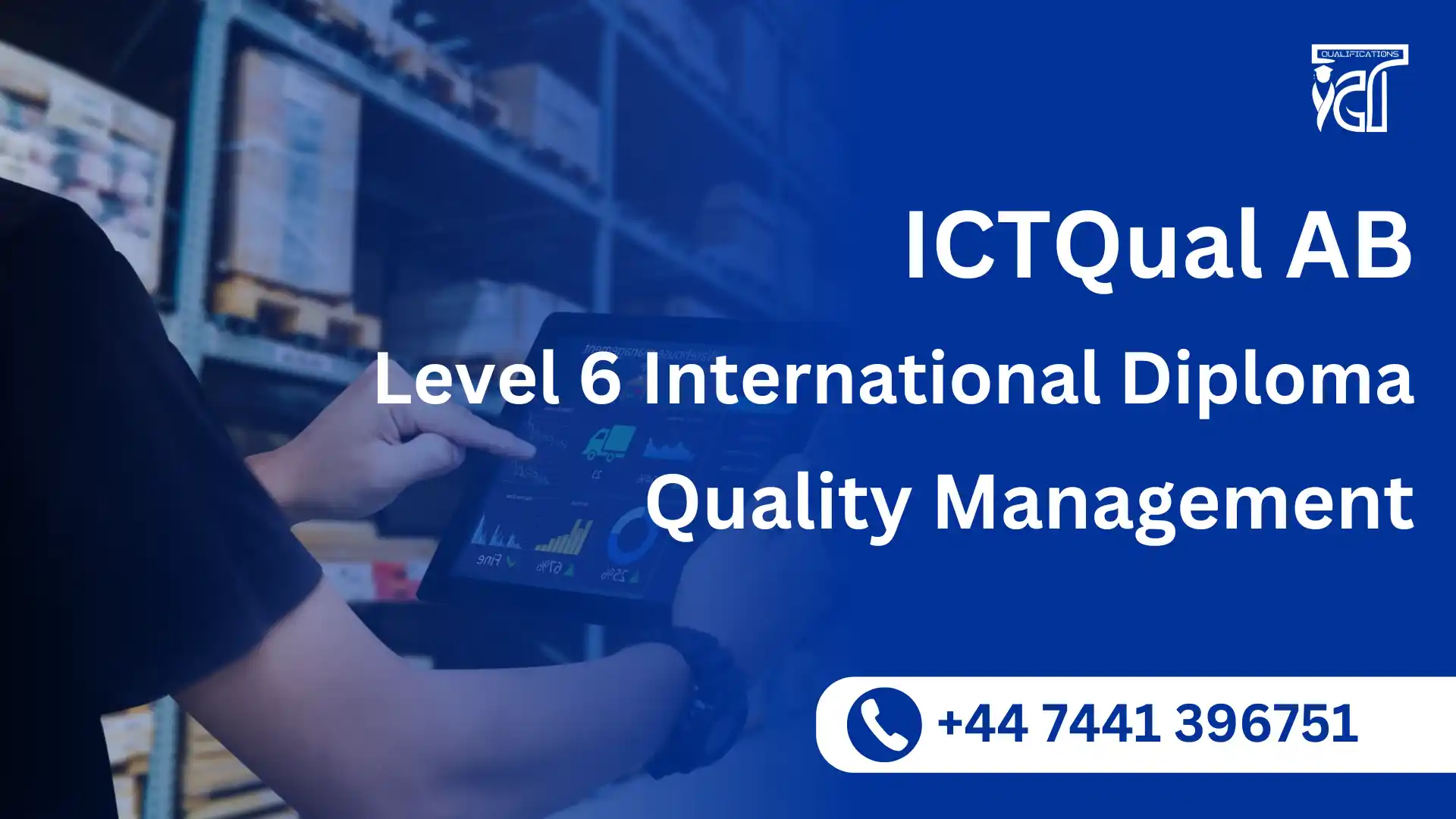The ICTQual AB Level 6 International Diploma in Quality Management is a prestigious and globally relevant qualification designed for learners aspiring to excel in quality assurance, operational excellence, and organisational improvement. Delivered over three years with a comprehensive 360-credit structure, this advanced programme prepares learners to meet the growing demand for skilled quality management professionals worldwide.
Ideal for both freshers entering the field and experienced professionals seeking career progression, the diploma equips learners with a deep understanding of quality systems, compliance standards, process optimisation, and performance measurement. It combines practical tools with strategic insights, enabling learners to implement effective quality frameworks that drive business success.
Throughout the programme, learners will explore key areas such as continuous improvement methodologies, auditing techniques, risk management, and stakeholder communication. By applying real-world scenarios and case studies, learners develop the ability to analyse processes critically, identify areas for improvement, and ensure products and services meet or exceed industry standards.
Graduates of this qualification gain competitive advantages in industries such as manufacturing, healthcare, logistics, engineering, and service delivery. Career opportunities include quality manager, compliance officer, process improvement specialist, and operational excellence consultant.
By completing this diploma, learners benefit from enhanced professional credibility, transferable skills, and the confidence to lead quality initiatives on an international scale. The course’s global relevance ensures graduates are fully equipped to deliver value, uphold standards, and make meaningful contributions to organisations across diverse sectors.
ICTQual AB Level 6 International Diploma in Quality Management
This qualification, the ICTQual AB Level 6 International Diploma in Quality Management, consists of 36 mandatory units.
Year 1 – Foundations of Quality Management
- Principles of Quality Management and Assurance
- Fundamentals of Organisational Excellence
- Business Law, Compliance, and Regulatory Frameworks
- Introduction to Operations and Process Management
- Workplace Health, Safety, and Risk Control
- Quality Tools, Techniques, and Measurement Basics
- Data Analysis and Research Methods in Quality
- Business Communication and Professional Reporting
- Leadership Fundamentals in Quality-Driven Organisations
- Information Technology for Quality and Operations
- Problem-Solving and Decision-Making in Business Contexts
- Corporate Social Responsibility and Ethical Quality Practices
Year 2 – Applied Quality and Organisational Practices
- Total Quality Management (TQM) Principles and Applications
- Lean Management and Six Sigma Methodologies
- International Standards and Certification Frameworks (e.g., ISO)
- Advanced Risk Management and Compliance in Quality Systems
- Performance Management and Organisational Measurement
- Human Resource Management in Quality-Focused Organisations
- Supply Chain Quality and Vendor Management
- Quality Auditing and Continuous Improvement Processes
- Project and Programme Management in Quality Environments
- Strategic Marketing and Quality in Global Markets
- Ethics, Governance, and Sustainability in Quality Systems
- Innovation and Change Management for Quality Professionals
Year 3 – Advanced Strategic Quality Leadership
- Strategic Management for Quality and Business Growth
- Advanced Quality Theories, Models, and Practices
- Global Excellence Frameworks (EFQM, Baldrige, etc.)
- Leadership, Change, and Organisational Transformation
- Quality in Digital Transformation and Smart Technologies
- International Trade, Policy, and Quality Assurance
- Crisis Management and Business Continuity in Quality Systems
- Emerging Trends in Global Quality and Sustainability
- Advanced Research Methods in Quality and Organisational Studies
- Dissertation / Final Research Project in Quality Management
- Global Business Strategy and Competitive Advantage through Quality
- Future of Quality Management and Industry 4.0 Integration
Learning Outcomes for the ICTQual AB Level 6 International Diploma in Quality Management:
Year 1 – Foundations of Quality Management
Principles of Quality Management and Assurance
- Explain the principles, history, and scope of quality management.
- Apply assurance models to support business objectives.
- Evaluate the impact of quality systems on organisational performance.
Fundamentals of Organisational Excellence
- Define organisational excellence and performance improvement frameworks.
- Assess organisational strengths and weaknesses using quality models.
- Recommend practices to enhance workplace excellence.
Business Law, Compliance, and Regulatory Frameworks
- Describe the foundations of business law in a quality context.
- Interpret compliance requirements relevant to global industries.
- Apply regulatory knowledge to business scenarios.
Introduction to Operations and Process Management
- Explain the role of operations management in delivering quality.
- Map and analyse core organisational processes.
- Suggest improvements to enhance efficiency and quality outcomes.
Workplace Health, Safety, and Risk Control
- Identify workplace hazards and associated risks.
- Apply health and safety principles to business operations.
- Evaluate the role of safety in overall quality management.
Quality Tools, Techniques, and Measurement Basics
- Demonstrate the use of basic quality tools and measurement systems.
- Apply statistical techniques for quality control.
- Analyse data to support decision-making.
Data Analysis and Research Methods in Quality
- Select appropriate research methods for quality investigations.
- Collect, interpret, and present business data.
- Apply findings to support evidence-based improvements.
Business Communication and Professional Reporting
- Demonstrate professional written and oral communication.
- Produce clear, structured business and quality reports.
- Apply cross-cultural communication in organisational contexts.
Leadership Fundamentals in Quality-Driven Organisations
- Explain leadership theories relevant to quality environments.
- Demonstrate motivational and team leadership techniques.
- Analyse the role of leadership in driving quality improvement.
Information Technology for Quality and Operations
- Apply digital tools to support quality processes.
- Demonstrate effective use of IT for analysis and reporting.
- Evaluate the contribution of IT to operational efficiency.
Problem-Solving and Decision-Making in Business Contexts
- Apply structured problem-solving models to workplace scenarios.
- Analyse decision-making processes in quality-driven settings.
- Develop solutions aligned with organisational objectives.
Corporate Social Responsibility and Ethical Quality Practices
- Explain CSR principles and their link to quality.
- Evaluate the ethical responsibilities of businesses.
- Apply CSR practices to organisational quality improvement.
Year 2 – Applied Quality and Organisational Practices
Total Quality Management (TQM) Principles and Applications
- Explain the core principles of TQM.
- Apply TQM practices to organisational contexts.
- Evaluate the benefits and challenges of TQM adoption.
Lean Management and Six Sigma Methodologies
- Explain Lean and Six Sigma concepts.
- Apply process improvement tools to reduce waste and variation.
- Analyse case studies of Lean Six Sigma implementation.
International Standards and Certification Frameworks (e.g., ISO)
- Describe the structure of international standards.
- Interpret ISO frameworks in relation to organisational needs.
- Apply certification processes in quality management systems.
Advanced Risk Management and Compliance in Quality Systems
- Identify risks affecting quality performance.
- Apply compliance frameworks to mitigate risks.
- Evaluate risk management case studies.
Performance Management and Organisational Measurement
- Explain key performance measurement tools and systems.
- Develop performance indicators aligned with quality goals.
- Evaluate performance data to support decision-making.
Human Resource Management in Quality-Focused Organisations
- Analyse HR’s role in supporting quality culture.
- Apply talent management and training for quality excellence.
- Evaluate HR practices in global quality contexts.
Supply Chain Quality and Vendor Management
- Explain quality challenges in global supply chains.
- Apply vendor selection and monitoring practices.
- Evaluate strategies for maintaining supply chain quality.
Quality Auditing and Continuous Improvement Processes
- Describe the principles of quality auditing.
- Apply audit tools and techniques to organisational contexts.
- Recommend improvements based on audit findings.
Project and Programme Management in Quality Environments
- Explain project management methodologies for quality initiatives.
- Apply risk, cost, and quality management to projects.
- Develop project documentation and delivery strategies.
Strategic Marketing and Quality in Global Markets
- Explain the link between marketing strategies and quality.
- Apply customer satisfaction and loyalty measures.
- Analyse marketing case studies with a quality focus.
Ethics, Governance, and Sustainability in Quality Systems
- Analyse ethical and governance issues in quality management.
- Apply sustainability practices in quality systems.
- Evaluate the long-term impact of governance models.
Innovation and Change Management for Quality Professionals
- Explain innovation frameworks in relation to quality.
- Apply change management techniques to quality initiatives.
- Analyse the role of innovation in continuous improvement.
Year 3 – Advanced Strategic Quality Leadership
Strategic Management for Quality and Business Growth
- Apply strategic models to quality and growth challenges.
- Develop strategic plans for quality improvement.
- Evaluate organisational strategies for sustainable growth.
Advanced Quality Theories, Models, and Practices
- Critically analyse advanced theories in quality management.
- Apply models to contemporary organisational challenges.
- Evaluate new practices in global quality management.
Global Excellence Frameworks (EFQM, Baldrige, etc.)
- Explain global excellence frameworks.
- Apply EFQM, Baldrige, and other models to case studies.
- Compare frameworks for organisational suitability.
Leadership, Change, and Organisational Transformation
- Demonstrate advanced leadership skills for transformation.
- Apply change management models to quality systems.
- Evaluate leadership’s role in organisational growth.
Quality in Digital Transformation and Smart Technologies
- Explain the impact of digital transformation on quality.
- Apply smart technologies to process improvement.
- Analyse digital innovations shaping quality systems.
International Trade, Policy, and Quality Assurance
- Explain the role of trade policies in quality management.
- Analyse international trade regulations and quality requirements.
- Apply quality assurance practices in global trade contexts.
Crisis Management and Business Continuity in Quality Systems
- Identify risks and potential crises affecting quality.
- Apply business continuity planning tools.
- Evaluate crisis management case studies.
Emerging Trends in Global Quality and Sustainability
- Identify trends shaping the future of quality management.
- Analyse the role of sustainability in future frameworks.
- Propose innovative strategies for emerging challenges.
Advanced Research Methods in Quality and Organisational Studies
- Apply advanced qualitative and quantitative research techniques.
- Critically evaluate academic and professional sources.
- Design research aligned with quality management objectives.
Dissertation / Final Research Project in Quality Management
- Conduct independent research on a quality-related issue.
- Apply methodologies to produce a comprehensive study.
- Present findings in a professional and academic format.
Global Business Strategy and Competitive Advantage through Quality
- Analyse competitive advantage models.
- Apply quality-driven strategies to enhance competitiveness.
- Evaluate global competition dynamics in quality contexts.
Future of Quality Management and Industry 4.0 Integration
- Explain Industry 4.0 and its relevance to quality.
- Analyse the role of digitalisation and AI in quality.
- Propose future-oriented strategies for quality professionals.
The ICTQual AB Level 6 International Diploma in Quality Management offers learners significant professional, practical, and career-focused benefits. This advanced programme equips learners with the tools and insights needed to lead quality initiatives and achieve excellence in a variety of industries.
1. Strengthened Professional Credibility
- Earn a globally recognised Level 6 qualification in quality management.
- Demonstrate advanced expertise to employers and stakeholders worldwide.
- Enhance your profile for senior management, compliance, and leadership positions.
2. Industry-Relevant Skills Development
- Master quality systems, compliance standards, and continuous improvement methodologies.
- Gain advanced knowledge of auditing techniques, risk assessment, and performance measurement.
- Build strategic skills for process optimisation and operational excellence.
3. Expanded Career Opportunities
- Access roles such as quality manager, compliance officer, process improvement specialist, or operational excellence consultant.
- Secure opportunities in diverse sectors, including manufacturing, healthcare, engineering, logistics, and service industries.
- Strengthen prospects for international career growth in quality assurance and management.
4. Practical Knowledge and Application
- Apply quality management theories to real-world business scenarios and projects.
- Lead initiatives that improve organisational performance and customer satisfaction.
- Develop confidence to handle quality audits, certifications, and compliance processes.
5. Long-Term Career Advancement
- Build transferable skills that remain valuable in evolving industries.
- Gain the knowledge and confidence to drive operational improvements and uphold standards.
- Position yourself as a trusted professional capable of managing complex quality challenges globally.
The ICTQual AB Level 6 International Diploma in Quality Management is tailored for learners who are committed to achieving excellence in quality assurance, operational improvement, and compliance management. Whether just beginning their professional journey or aiming to advance into senior roles, this programme provides the knowledge and skills needed to succeed in diverse industries.
1. Early-Career Learners and Graduates
- Learners looking to establish a solid foundation in quality management.
- Graduates seeking a globally recognised qualification to enhance employability.
- Individuals eager to gain practical skills in quality systems, process optimisation, and auditing techniques.
2. Experienced Professionals Seeking Advancement
- Quality officers, supervisors, or managers aspiring to progress into leadership or consultancy roles.
- Professionals aiming to deepen their understanding of continuous improvement, risk management, and compliance standards.
- Entrepreneurs or business owners wishing to implement robust quality frameworks within their organisations.
3. Globally-Oriented Learners
- Learners pursuing career opportunities in international companies or quality-driven industries.
- Professionals seeking to enhance cross-functional leadership, stakeholder communication, and strategic decision-making skills.
- Individuals committed to long-term career growth and operational excellence in global markets.
This programme is perfect for learners who value practical, industry-relevant education and seek to make a meaningful impact in quality assurance and organisational performance worldwide.
Completing the ICTQual AB Level 6 International Diploma in Quality Management positions learners for significant career advancement and broader opportunities in quality-focused industries worldwide. This comprehensive programme equips learners with practical expertise, leadership skills, and industry-relevant knowledge to take on higher responsibilities.
1. Career Advancement Opportunities
- Progress into senior management roles such as Quality Manager, Compliance Lead, or Operational Excellence Consultant.
- Take on strategic positions in quality assurance, process optimisation, or continuous improvement teams.
- Lead cross-functional quality initiatives within multinational organisations and competitive markets.
2. Expanded Professional Network and Recognition
- Strengthen professional credibility with a globally recognised qualification in quality management.
- Build connections across industries, including manufacturing, healthcare, engineering, logistics, and service delivery.
- Increase employability for roles that demand advanced knowledge of quality systems and compliance standards.
3. Long-Term Skill and Knowledge Development
- Apply learned methodologies to enhance organisational performance and operational efficiency.
- Develop transferable skills for diverse sectors and evolving global business environments.
- Position yourself as a trusted professional capable of driving sustainable quality improvements.
This diploma provides learners with the tools, confidence, and expertise to progress professionally, manage complex quality challenges, and make impactful contributions to organisations worldwide.
As an approved centre of ICTQual AB, we provide two flexible certification routes for learners pursuing the ICTQual AB Level 6 International Diploma in Quality Management. By enrolling with us, learners can select the pathway that best matches their background and career aspirations.
1. Experienced Professionals Route
- Designed for learners with a minimum of six (6) years of verifiable experience in quality management, compliance, or related fields.
- Recognises your existing expertise and allows you to achieve certification without completing all assignments.
- A fast-track route to validate your professional knowledge and gain a globally respected qualification.
2. Fresh Candidates Route
- Suitable for new learners or those with limited hands-on experience in quality management.
- Requires the successful completion of 36 structured assignments to ensure in-depth learning of quality systems, operational excellence, and compliance standards.
- Provides a comprehensive foundation to prepare learners for entry-level to mid-level roles in quality management and process improvement.
By enrolling through our approved centre, learners benefit from expert support, robust study materials, and a recognised pathway to advance in quality management and organisational excellence.
Entry Requirements
To enrol in the ICTQual AB Level 6 International Diploma in Quality Management, learners must meet the following entry criteria to ensure they are prepared for the programme’s advanced content:
Age Requirement
- Learners must be 18 years or older at the time of enrolment.
Educational Background
- A Level 5 diploma or equivalent qualification in a related field (e.g., business, management, or quality assurance).
- Alternatively, completion of secondary education with substantial relevant work experience may be considered.
Work Experience
- While not mandatory for all learners, 2–3 years of experience in quality management, operations, or a related discipline is highly recommended for optimal learning outcomes.
English Language Proficiency
- Learners must demonstrate proficiency in English to engage effectively with course materials and assessments.
- Acceptable evidence includes prior education in English, recognised language test scores (e.g., IELTS 5.5+ or equivalent), or an internal language assessment.
Register Now
Qualification Process
Qualification Process for the ICTQual AB Level 6 International Diploma in Quality Management
- Self-Assessment:
Begin by evaluating your eligibility to ensure you meet the qualification requirements, including work experience, knowledge, and language proficiency. - Registration:
Complete your registration by submitting the required documents, including a scanned copy of a valid ID, and paying the registration fee. - Induction:
An assessor will conduct an induction to confirm your eligibility for the course and explain the evidence requirements. If you do not meet the criteria, your registration will be cancelled, and the fee will be refunded. - Assignments & Evidence Submission:
Provide all assignments and the necessary evidence based on the assessment criteria outlined in the course. If you are unsure of the required evidence, consult with the assessor for guidance on the type and nature of evidence needed. - Feedback and Revision:
The assessor will review your submitted evidence and provide feedback. Evidence that meets the criteria will be marked as “Criteria Met,” while any gaps will be identified. You will be asked to revise and resubmit if needed. - Competence Evidence:
Submit final evidence demonstrating that all learning outcomes have been met. This evidence will be marked as “Criteria Met” by the assessor once it is satisfactory. - Internal Quality Assurance (IQA):
The Internal Quality Assurance Verifier (IQA) will review your evidence to ensure consistency, quality, and compliance with standards. - External Verification:
The IQA will submit your portfolio to ICTQUAL AB External Quality Assurance Verifiers (EQA) for final confirmation. The EQA may contact you directly to verify the authenticity of your evidence. - Certification:
Upon successful completion of all checks, ICTQUAL AB will issue your official certificate, confirming that you have attained the ICTQual AB Level 6 International Diploma in Quality Management.







